The Politics and Law of Trump's Second Impeachment
Paul Gigot interviews former Attorney General Michael Mukasey
Details of the upcoming impeachment trial for President Trump are still up in the air as Senate Majority Leader Mitch McConnell and Senate Minority Leader Chuck Schumer -- who will soon swap jobs -- have remained silent about the details of how the trial will work, how long it will last and more.
When the trial will start is up in the air as well. House Speaker Nancy Pelosi, D-Calif., after overseeing the impeachment of Trump just one week after he riled up a group of supporters who later ransacked the Capitol while Congress was certifying the election results, has yet to send the article of impeachment to the Senate.
Pelosi did not answer questions during a Friday press conference on when she would send over the article. Her office also did not immediately respond to a message from Fox News on Monday morning asking when she would send the article.
The Senate, once it gets the article, will be legally required to start a trial forthwith. This would take up much of the body's calendar even as President-elect Joe Biden will need it to confirm some of his most important nominees. This could be a reason why Pelosi has not sent over the article -- to give Schumer time to confirm some Biden nominees or pass some legislation before a trial starts.
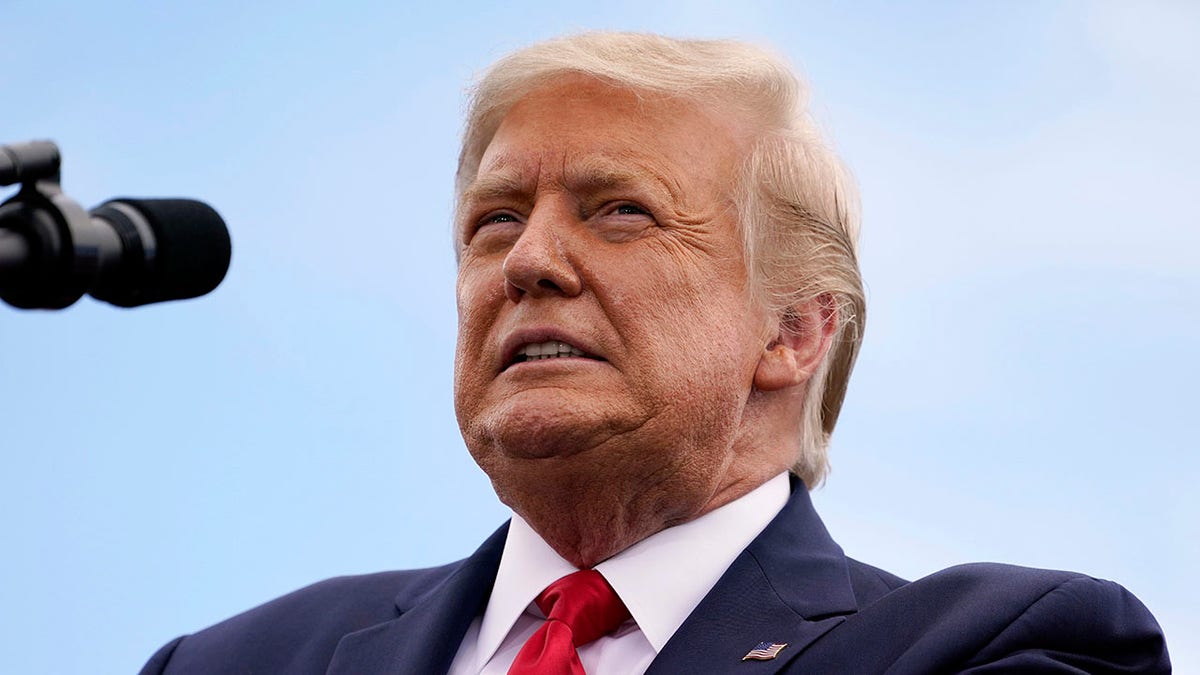
President Donald Trump speaks at the Jupiter Inlet Lighthouse and Museum in Jupiter, Fla. Trump is set to leave office Wednesday before the Senate begins an impeachment trail that could result in him being barred from holding office in the future. (AP Photo/Evan Vucci, File)
SEN. CORY BOOKER EXPECTS TRUMP IMPEACHMENT TRIAL 'AS QUICKLY AS POSSIBLE'
"Well, we have the trial of the president. That's mandated by law," Schumer, D-N.Y., said in an interview on CBS' "60 Minutes" Sunday. "Second, there's a very, very real need for President Biden to have in place key people in his Cabinet, the people in charge of national security, the people in charge of domestic security, the people in charge of making sure everyone gets vaccinated as quickly as possible."
He added: "And third, this country is in the greatest economic crisis since the Depression, the greatest health care crisis since the Spanish pandemic flu 100 years ago, and we must pass more relief for the American people. We must do all three and we have to do them all quickly. One cannot stand in the way of the other."
Still, the Senate can't do anything on impeachment until it actually gets the impeachment article, meaning the ball is still in Pelosi's court.
The contours of the impeachment trial, meanwhile, are still unclear. Schumer and McConnell, R-Ky., haven't announced any kind of agreement on the ground rules. This includes whether there will be witnesses, how long the trial will last or even who will preside over the trial -- it's not constitutionally clear if it's required that Chief Justice John Roberts preside over a trial for a former president rather than a sitting president, as he did last year.
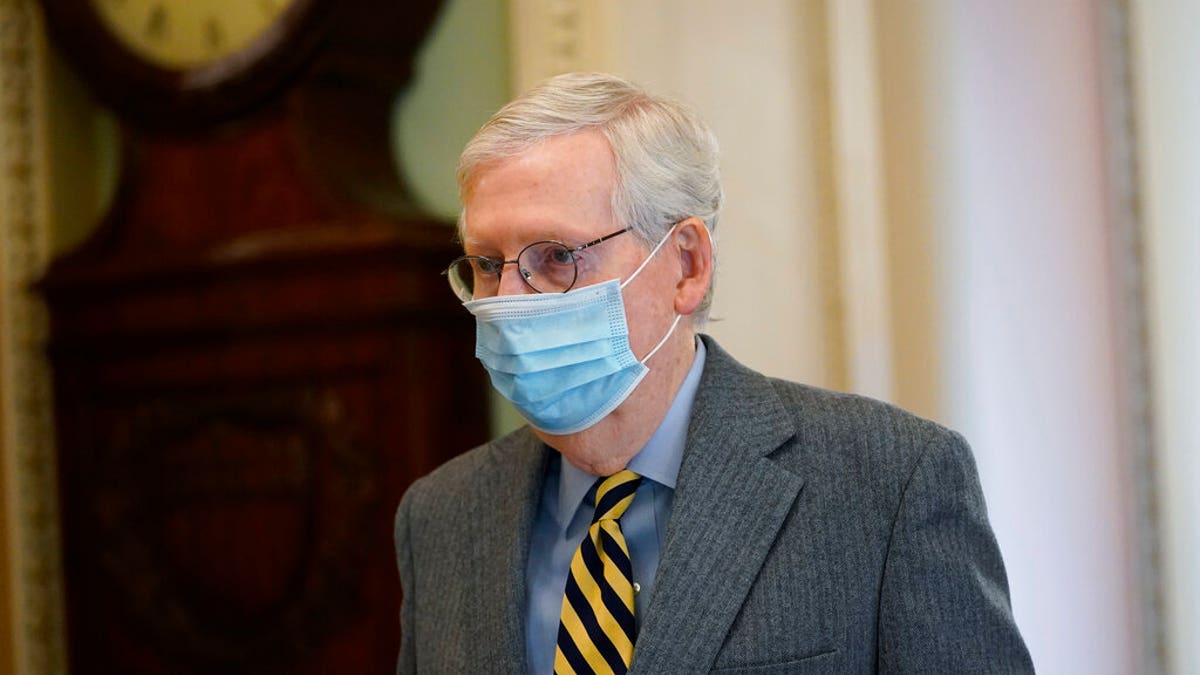
In this Dec. 30, 2020, file photo Senate Majority Leader Mitch McConnell of Ky., walks to the Senate floor on Capitol Hill in Washington. McConnell said last week there is no way the Senate would have been able to convict President Trump at an impeachment trial before he leaves office. (AP Photo/Susan Walsh, File)
Representatives for McConnell and Schumer didn't immediately respond to questions on how the trial will work.
On timing specifically, McConnell warned against a very short trial while also making clear that even if the Senate had immediately started a trial it wouldn't be able to conclude before Trump leaves office.
"The Senate has held three presidential impeachment trials. They have lasted 83 days, 37 days, and 21 days, respectively," McConnell said.
"Even if the Senate process were to begin this week and move promptly, no final verdict would be reached until after President Trump had left office," he said last week. "This is not a decision I am making; it is a fact. The president-elect himself stated last week that his inauguration on January 20 is the ‘quickest’ path for any change in the occupant of the presidency."
DEMOCRATS WON'T COMMIT TO IMPEACHMENT TIMELINE AFTER SOUNDING ALARM ABOUT TRUMP
Then, once the trial starts, the question will become which GOP senators will vote to convict Trump. Some who have long been critical of the president -- including Sens. Ben Sasse, R-Neb., Mitt Romney, R-Utah, and Lisa Murkowski, R-Alaska -- are good bets to join Democrats.
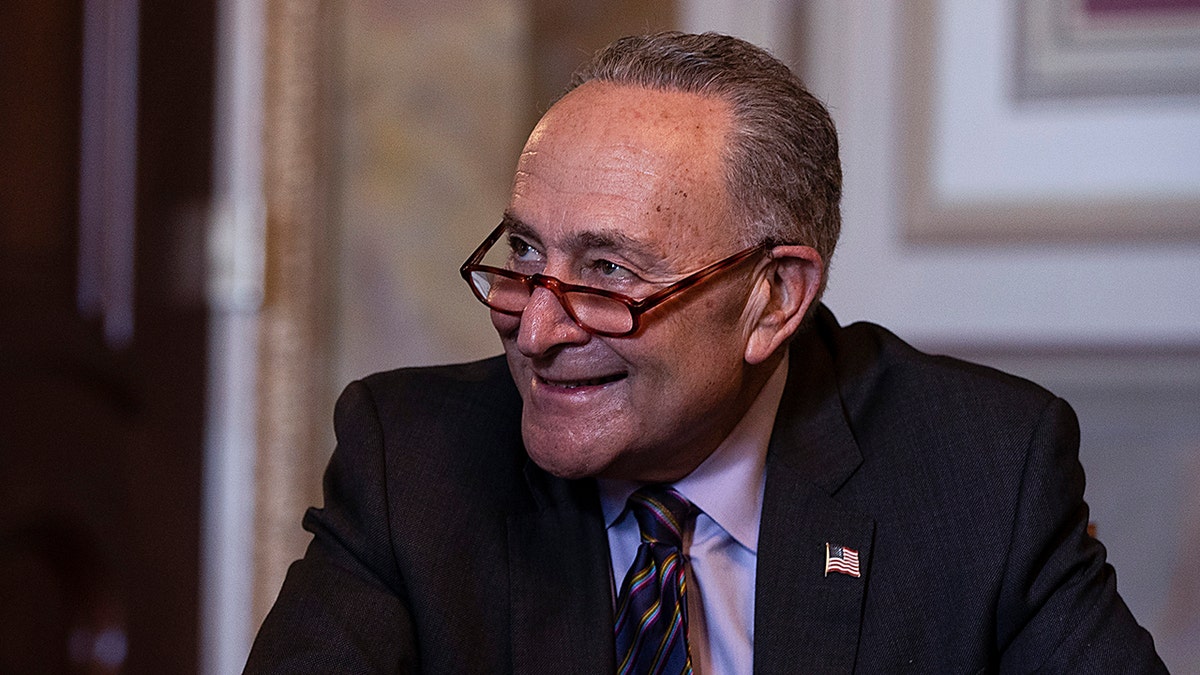
Senate Minority Leader Chuck Schumer (D-NY) meets virtually with incoming Secretary of Housing and Urban Development Marcia Fudge on December 17, 2020 in Washington, DC. Schumer will soon be the majority leader, and will oversee an impeachment trial of President Trump. (Photo by Tasos Katopodis/Getty Images) (Getty Images)
But whether 17 Republicans, the number that would be needed to join 50 Democrats to reach the required two-thirds threshold, vote to convict the president will rely largely on what McConnell does.
McConnell, who has been reported to be angry with the president over his behavior since the election, has left open the door to voting to convict Trump.
"While the press has been full of speculation, I have not made a final decision on how I will vote, and I intend to listen to the legal arguments when they are presented to the Senate," McConnell said in a note to Republican colleagues on Wednesday.
McConnell managed to keep the Senate GOP caucus together through almost all of the Trump presidency before its unity shattered over election challenges and Trump's behavior in the final days of his term. If Senate Republicans' trusted leader decides to vote to convict Trump, it's likely to give other members who are disgusted with Trump -- and are interested in potentially barring him from office in the future -- the political cover to do so as well.
Those who might join McConnell include close allies Sens. John Cornyn, R-Texas, and John Thune, R-S.D., among others.
BIDEN: 'NOT AFRAID' TO TAKE OATH OUTSIDE AMID INAUGURATION SECURITY CONCERNS
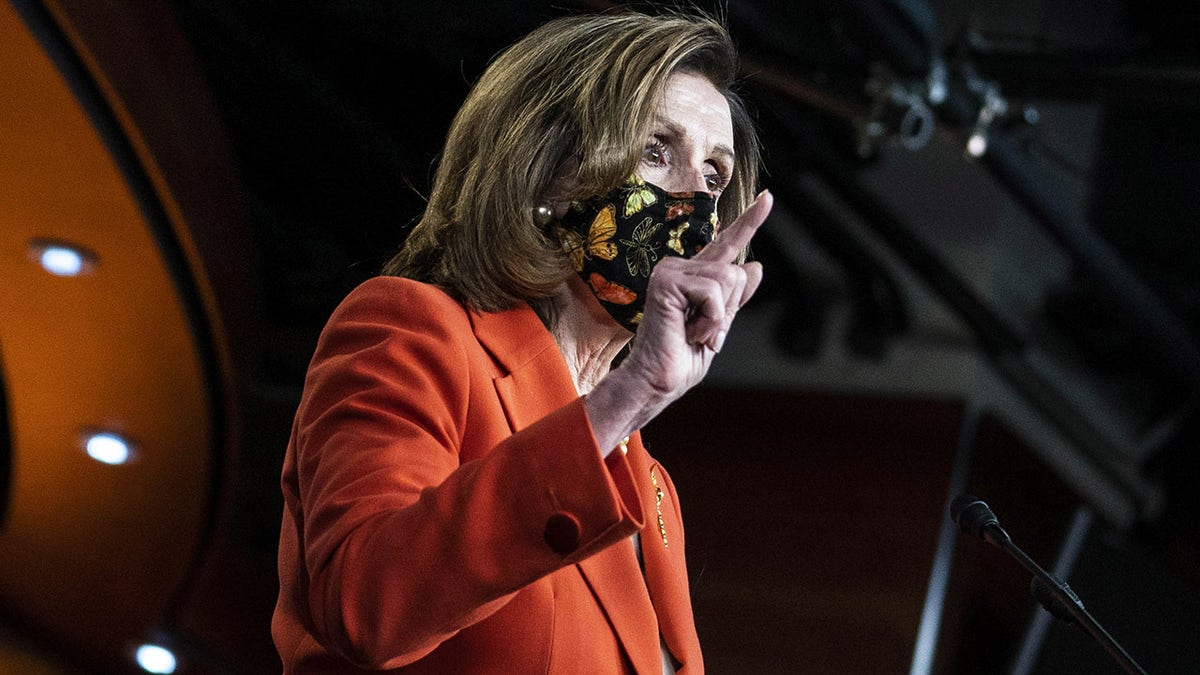
U.S. House Speaker Nancy Pelosi, a Democrat from California, speaks during a news conference at the U.S. Capitol in Washington, D.C., U.S., on Friday, Jan. 15, 2021. Pelosi described the impeachment of President Donald Trump as "so urgent" but declined to say when the House will send the single charge for inciting insurrection to the Senate to begin his trial. Photographer: Sarah Silbiger/Bloomberg via Getty Images (Getty Images)
There will be some Republicans arguing that the Senate cannot hold an impeachment trial once a president leaves office. Trump, his legal team, or Trump-aligned senators may even try to have a court declare that to be the case. But it's unlikely that the courts will weigh in on such a heavy constitutional question that is so intertwined with checks and balances provided to another branch. They will probably leave what the Senate does up to the Senate.
And Schumer, the soon-to-be majority leader, has made clear there will be a trial.
"What Donald Trump did is the most despicable action any president has ever taken. And he should be convicted at this trial," Schumer said on "60 Minutes" Sunday. "In addition, if we convict him, we can then, by only 51 votes, remove him from ever running for office again. I know we wanna heal. But when something this awful happens, to just push it off will not heal."
All of this is happening against the backdrop of Washington, D.C., and Capitol Hill specifically, transforming into a massive military staging ground ahead of the Biden inauguration which is set for Wednesday -- the same day the Senate impeachment trial could start if Pelosi doesn't continue to delay transmitting the article to the upper chamber.
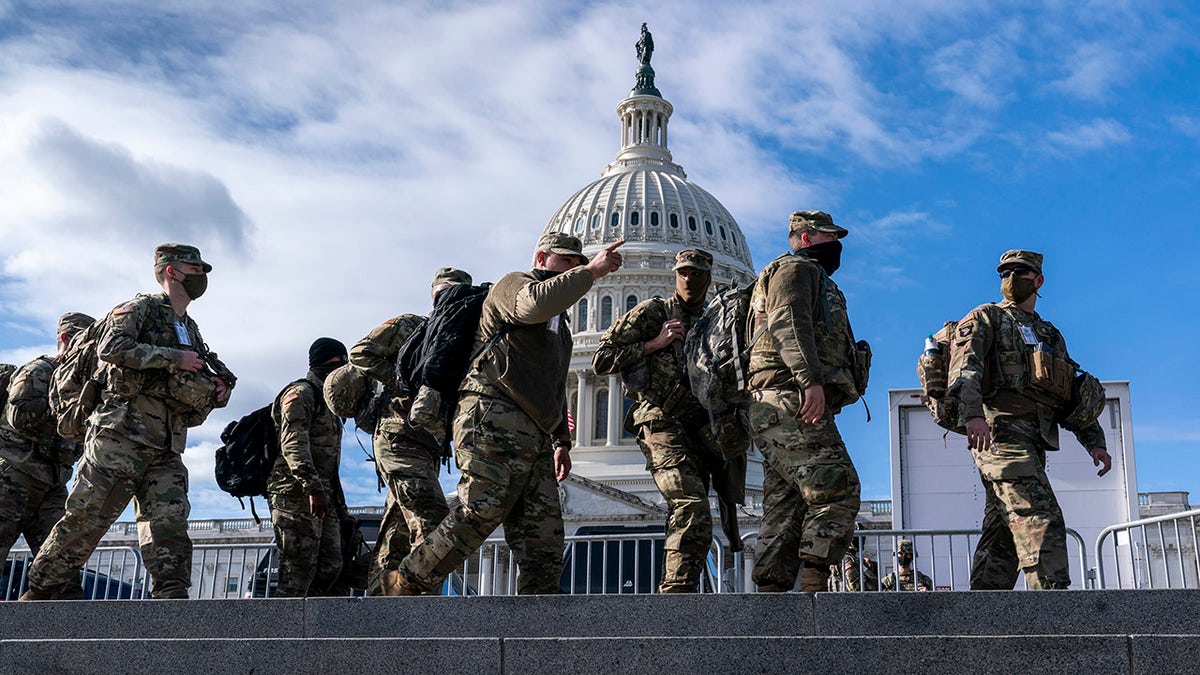
National Guard troops reinforce security around the U.S. Capitol ahead of the inauguration of President-elect Joe Biden and Vice President-elect Kamala Harris, Sunday, Jan. 17, 2021, in Washington. (AP Photo/J. Scott Applewhite)
The Department of Defense has sent 25,000 National Guard troops to the capital as the U.S. Secret Service leads preparations to keep the event safe.
Biden said last week that he is "not afraid" of taking the oath of office outdoors amid security concerns. And with a massive perimeter around the Capitol, streets closed through large swaths of downtown D.C. and significantly more troops on Capitol Hill than in Iraq and Afghanistan, the event is likely to be secure from the kind of outside attack seen on Jan. 6.
CLICK HERE TO GET THE FOX NEWS APP
But officials are worried about an attack from the inside, too.
The FBI is vetting federal troops in D.C., amid worries from defense officials that some of the National Guard troops may be sympathetic to the false claims by Trump that he won the presidential election, which spurred the insurrection at the Capitol on Jan. 6.
"We’re continually going through the process, and taking second, third looks at every one of the individuals assigned to this operation," Army Secretary Ryan McCarthy told The Associated Press on Sunday. He said that their priority is ensuring a peaceful transfer of power. "We want to send the message to everyone in the United States and for the rest of the world that we can do this safely and peacefully," McCarthy said.
It's also unclear how long the massive new security measures will remain at the Capitol, as security threats won't necessarily dissolve the day after Biden is inaugurated. The tight measures might continue well into Trump's impeachment trial, which is sure to enrage his most fervent backers, and potentially longer.
Fox News' Kelly Phares, Brooke Singman, Caroline McKee, Lucas Tomlinson, Paul Steinhauser and the Associated Press contributed to this report.














































